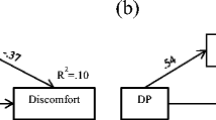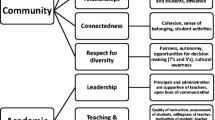Abstract
Cheating among college students has generally been studied from a student perspective. The research discussed here looks at student cheating from a faculty perspective. Utilizing the responses of 789 faculty members at 16 institutions located throughout the United States, it examines typical faculty responses to incidents of student cheating and how the presence of a student honor code influences faculty responses. These findings are compared to student perspectives on how faculty address incidents of cheating using data collected from over 3,000 students at the same 16 institutions in an earlier phase of this research project.
Similar content being viewed by others
References
Baird, J. S. (1980). Current trends in college cheating.Psychology in the Schools 17(4):515–522.
Bowers, W. J. (1964).Student Dishonesty and Its Control in College. New York: Bureau of Applied Social Research, Columbia University.
Brooks, C. M., Cunningham, R., Hinson, N., Brown, S., and Weaver, B. (1981). Student attitudes toward a medical school honor code.Journal of Medical Education 56(8):669–671.
Campbell, W. G. (1935).A Comparative Investigation of Students Under an Honor System and a Proctor System in the Same University. Los Angeles: University of Southern California Press.
Canning, R. (1956). Does an honor system reduce classroom cheating? An experimental answer.Journal of Experimental Education 24(4):291–296.
Collison, M. (1990). Survey at Rutgers suggest that cheating may be on the rise at large universities.The Chronicle of Higher Education, October 24:A31-A32.
Drake, C. A. (1941). Why students cheat?Journal of Higher Education 12(November):418–420.
Eisenberger, R., and Shank, D. M. (1985). Personal work ethic and effort training affect cheating.Journal of Personality and Social Psychology 49(2):520–528.
Fass, R. A. (1986). By honor bound: Encouraging academic honesty.Educational Record 67(4):32–35.
Hartshorne, H., and May, M. A. (1928).Studies in Deceit. New York: The Macmillan Co.
Hetherington, E. M., and Feldman, S. E. (1964). College cheating as a function of subject and situational variables.Journal of Educational Psychology 55(4):212–218.
Jendrek, M. P. (1989). Faculty reactions to academic dishonesty.Journal of College Student Development 30(5):401–406.
McCabe, D. L., and Trevino, L. K. (1993). Academic dishonesty: Honor codes and other contextual influences.Journal of Higher Education, in press.
Michaels, J. W., and Miethe, T. D. (1989). Applying theories of deviance to academic cheating.Social Science Quarterly 70(4):870–885.
Nuss, E. M. (1984). Academic integrity: Comparing faculty and student attitudes.Improving College and University Teaching 32(3):140–144.
Pavela, G. R., and McCabe, D. L. (1992). Changing strategies for promoting academic integrity. Working paper, University of Maryland, College Park.
Perry, A. R., Kane, K. M., Bernesser, K. J., and Spicker, P. T. (1990). Type A behavior, competitive achievement-striving, and cheating among college students.Psychological Reports 66(2):459–465.
Singhal, A. C. (1982). Factors in students' dishonesty.Psychological Reports 51(3):775–780.
Stern, E. B., and Havlicek, L. (1986). Academic misconduct: Results of faculty and undergraduate student surveys.Journal of Allied Health 15(2):129–142.
Tabor, M. B. W. (1987). Honor codes get a second look.Christian Science Monitor, January 30:B3.
Tittle, C. R., and Rowe, A. R. (1973). Moral appeal, sanction threat, and deviance: An experimental test.Social Problems 20(4):488–497.
Ward, D. A. (1986). Self-esteem and dishonest behavior revisited.Journal of Social Psychology 126(6):709–713.
Ward, D. A., and Beck, W. L. (1990). Gender and dishonesty.Journal of Social Psychology 130(3):333–339.
Wright, J. C., and Kelly, R. (1974). Cheating: Student/faculty views and responsibilities.Improving College and University Teaching 22(1):31–34.
Author information
Authors and Affiliations
Rights and permissions
About this article
Cite this article
McCabe, D.L. Faculty responses to academic dishonesty: The influence of student honor codes. Res High Educ 34, 647–658 (1993). https://doi.org/10.1007/BF00991924
Received:
Issue Date:
DOI: https://doi.org/10.1007/BF00991924




